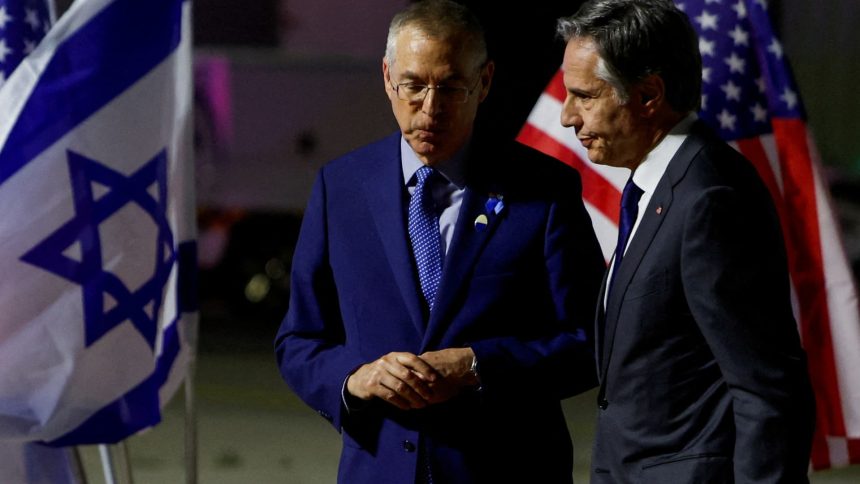U.S. Secretary of State Antony Blinken issued harsh words for Israel, criticizing its operations in the Gaza Strip and saying it lacked a plan to protect civilian life ahead of an expected assault on the city of Rafah, where more than 1.2 million displaced Palestinians are sheltering.
“We believe two things,” Blinken said in an interview with the CBS program “Face The Nation” that aired Sunday.
“One, you have to have a clear, credible plan to protect civilians, which we haven’t seen. Second, we also need to see a plan for what happens after this conflict in Gaza is over, and we still haven’t seen that.”
The comments came against a backdrop of increasingly tense relations between Israel and its No. 1 ally as the Biden administration last week confirmed it was pausing a shipment of 3,500 heavy-payload bombs to the Jewish state. It was the first ever such move by President Joe Biden, who has long been a staunch supporter of Israel. He confirmed that U.S. support still remains “ironclad.”
Administration officials say the move stemmed from concern over the use of the weapons — 1,000- and 2,000-pound bombs — on a densely populated area like Rafah, which is now completely surrounded by Israeli forces as its war-ravaged population grapples with military strikes, hunger, disease and a severe lack of sufficient humanitarian aid.
Israeli Prime Minister Benjamin Netanyahu says a Rafah ground assault is the only way to defeat Palestinian militant group Hamas, which governs the Strip and launched a brutal terrorist attack on Israel on Oct. 7 that killed some 1,200 people there and took roughly 250 hostage.
Around 130 hostages remain in Gaza, with roughly a quarter believed to be dead. Their release is a key part of a potential cease-fire deal, over which Israeli and Hamas officials — along with America, Egyptian and Qatari mediators — have been negotiating for months. The Israel-Hamas war has killed more than 34,000 people in Gaza, according to Palestinian health authorities in the besieged enclave.
‘Hamas is coming back’
The Biden administration has made clear its opposition to a Rafah offensive, and on Sunday Blinken elaborated on its position.
“What are we seeing right now? We’re seeing parts of Gaza that Israel has cleared of Hamas where Hamas is coming back, including in the north, including in Khan Younis,” Blinken said.
“As we look at Rafah [Israel] may go in and have some initial success, but potentially at an incredibly high cost to civilians, one that is not durable, one that is not sustainable, and they will be left holding the bag on an enduring insurgency because a lot of armed Hamas will be left no matter what they do in Rafah.”
He warned that an insurgency by the militant group will only worsen without a credible “day after” plan for Gaza, which Israel’s government has not presented, and that getting out of Gaza is what “we believe they [Israeli forces] need to do.”
“Israel is on the trajectory potentially to inherit an insurgency with many armed Hamas left, or, if it leaves, a vacuum filled by chaos, filled by anarchy, and probably refilled by Hamas again,” the State Department chief said in a separate interview with NBC News. “We’ve been talking to them about a much better way of getting an enduring result, enduring security.”
U.S. weapons shipments to Israel continue
The administration’s criticism has not gone down well among Israel’s right-wing leadership. Israeli diplomats have described anger and frustration, while some Israeli lawmakers attacked Biden for the weapons shipment pause, accusing him of being a Hamas supporter. The U.S. is Israel’s single biggest supporter and source of military funding, and has provided it with hundreds of billions of dollars in military aid since its founding.
Despite the announced pause on the shipment of the 3,500 heavy-payload bombs, the administration noted that other weapons, including precision munitions and those included in a $26.4 billion military assistance package for Israel recently approved by Congress, would continue to be supplied as planned.
Blinken also addressed a recent U.S. national security memorandum which concluded that it was “reasonable to assess” that Israel had violated international law, but said that evidence was still incomplete and the investigation would continue. The report, which Blinken signed, described Israeli civilian harm mitigation efforts as “inconsistent, ineffective and inadequate.”
Read more CNBC politics coverage
“We’ve been working for many weeks on developing critical plans for security, for governance, for rebuilding. We haven’t seen that come from Israel,” Blinken told CBS.
“We’ve been working with Arab countries and others on that plan. We need to see that, too — we have the same objective as Israel,” he said.
“We want to make sure that Hamas cannot govern Gaza again … we have a different way, and we think a more effective, durable way of getting that done, and we’ll remain in conversation with Israel about exactly that.”
Read the full article here




